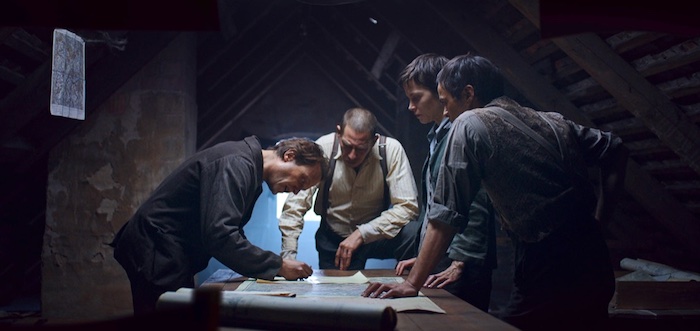
Having been pleasantly surprised by the 2018 German-Israeli co-production The Cakemaker, I was looking forward to Plan A, another German-Israeli co-production. The Cakemaker had explored the still difficult relationship between the two countries but on an intimate scale and in modern-day Israel. Plan A, however, is a historical film that gets to the heart of that difficult relationship by recreating, at least in part, a true story related to the Holocaust: Following the liberation of the camps in 1945, a group of survivors work together secretly on a scheme to poison the Berlin water supply as an act of revenge. Not much of this story is presented in an intimate fashion, and in the end, while the movie, directed by brothers Doron and Yoav Paz, is competent and often quite suspenseful, the shifting moral certitudes among the characters becomes something of a chore: Will they or won’t they? gives way to a nagging sense that it’s very doubtful that it all went down in this way.
For one thing, the movie is almost all in English, thus giving the whole production the quality of a fantasy. It opens with a voiceover challenge: “Just imagine that your entire family was murdered,” the idea being that the viewer must put themselves in the position of many of these conspirators, who feel justified in killing as much of the civilian population of Berlin in retaliation for what the Germans did to the Jews, even though many of the victims will not be Germans but also members of allied forces and even other surviving Jews. This caveat will be repeated throughout the action that unfolds to diminishing effect, mainly because the focus is on action for action’s sake, though obviously the filmmakers want to say something about the nature of revenge. That their message is confused and muddled may indicate that too many people with too many conflicting ideas were involved.
In addition to the plotters, there is a contingent of Jews who are dedicated to the idea of relocating to Palestine, where fighting is already under way between underground Zionist factions and non-Jewish residents, and for a while the contrast and conflict between these two groups is compelling, but the exposition is stiff and anecdotal, and you lose sight of the larger historical context. It becomes a drama about individual character, but except for the protagonist (August Diehl), a Jewish civil engineer who, in the chaos after surrender, has been given access to the city’s water works, the characters themselves are so simplistic that they never come through as people, only figures to put across the plot and the themes, some of which—could the Jews have done more to resist their extermination; how could any Jew trust the West to let them have their own country?—are worth discussing. And in the end, the practical argument against the plot—that if they indiscriminately kill civilians, the West won’t give them Israel—ends up overshadowing the moral argument against it. In truth, if the movie were a complete fiction, it might at least stand on its own as entertainment, but it keeps reminding us that Israel came into being and was thus the best revenge possible. That’s not how history works.
In English and German. Now playing in Tokyo at Human Trust Cinema Yurakucho (03-6259-8608), Shinjuku Musashinokan (03-3354-5670).
Plan A home page in Japanese
photo (c) 2020 Getaway Pictures GmbH & Jooyaa Film GmbH, UCM United Channels Movies, Phiphen Pictures, cine plus, Bayerischer Rundfunk, Sky, Arte

Surprised that revenge should be the theme of post-Holocaust Jews, I must be an anomaly these days. We were led to find meaning rather in such passages as “Vengeance is Mine; ” [says the LORD] “I will repay.” [Dt 32:35] So, the conclusion is something like Proverbs 20:22. Or even the “mark of Cain” which is to prevent any vigilante from taking revenge even in a very well-publicized case [Gen chp. 4]. It is said that Orthodox Jews are non-violent. The late Krister Stendahl compared the fetus of a woman considering abortion to the Jews in what he called “a conflict of liberation movements” (i.e., with other claimants to Palestine). Surely a situation to be avoided in the future! (since we cannot easily confer “the right side status” to either part). Nevertheless since these conflicts exist already, just how does one rightly abandon everything to an all-wise, all-merciful Divine? Flight gets one nowhere, yet to fight? To be wounded like Jacob whose judo opponent was God? Or to curse as Job was bid? Perhaps he found that abandoning the Divine (should that really be fussy about mere words) only showed the Otherness of THAT, the “Other Power” of being not yet damned despite lacking effort badges.
Note that in my attempt at theology [Richard R. Niebuhr had said “sin boldly”], “the Divine” refers to KAMI which = God or the gods. So the “that” in the parenthesis near the end of the above comment should be capitalized as it refers to the Divine[=God or the gods]. The last sentence means to say “Job perhaps discovered that abandoning the Divine (should That really be fussy about mere words) served to show him the Otherness of THAT, the “Other Power” involved in one’s being not yet damned, despite lacking in any effort badges.” [I used the Girl Scout badge idea for the pretenses of absolute integrity that Job seems to have dropped after his encounter with the Whirlwind.]